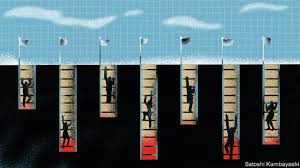As the virus upends productive activity across the world, the question now is how bad things will get.
病毒顛覆了世界各地的生產(chǎn)活動,現(xiàn)在的問題是事情會變得多糟糕。
On April 14th the IMF warned that the global recession would be the deepest for the best part of a century.
4月14日,IMF警告稱這將是一個世紀(jì)以來最嚴(yán)重的全球經(jīng)濟(jì)衰退。
But the severity of the pandemic and the uncertainty around the duration of lockdowns are such that economists' models,
但是疫情的嚴(yán)重程度和封鎖期間的不確定性,使得經(jīng)濟(jì)學(xué)家在戰(zhàn)后時期
trained on business cycles in the postwar era, are of little use.
接受過商業(yè)周期訓(xùn)練的模型幾乎毫無作用。
Some companies, such as Starbucks and Dell, have pulled their guidance on annual earnings, declining even to hazard a guess about the future.
像星巴克和戴爾這樣的一些公司,已經(jīng)取消了對年度收益的預(yù)期,甚至拒絕對未來進(jìn)行猜測。
Amid the fog, however, one thing seems certain: some economies will suffer much more than others.
但在不確定中,有一件事似乎是確定的:一些經(jīng)濟(jì)體將比其他經(jīng)濟(jì)體遭受更大的損失。
Economic crises expose and exacerbate structural weaknesses.
經(jīng)濟(jì)危機(jī)暴露并加劇了經(jīng)濟(jì)結(jié)構(gòu)的弱點。
Analysis by The Economist of five decades of GDP data finds that growth rates in rich countries tend to converge during expansions,
本刊對50年GDP數(shù)據(jù)的分析發(fā)現(xiàn),在經(jīng)濟(jì)擴(kuò)張時期,發(fā)達(dá)國家的經(jīng)濟(jì)增長率趨于一致,
as even the weakest economies are pulled along. Yet during downturns performance diverges markedly.
即使是最弱的經(jīng)濟(jì)體也會被拉著前進(jìn)。但在低迷時期,經(jīng)濟(jì)表現(xiàn)明顯不同。
In the first half of the 2000s the average annual gap between the GDP growth rates of the best-and worst-performing rich countries was five percentage points.
在本世紀(jì)前五年,經(jīng)濟(jì)增長率表現(xiàn)最好和最糟糕的發(fā)達(dá)國家之間的平均年度GDP差距是5個百分點。
In 2008-12, in the recession that followed the global financial crisis, the gap widened to ten points.
2008年至2012年,在全球金融危機(jī)之后的經(jīng)濟(jì)衰退中,這一差距擴(kuò)大到10個百分點。

This recession will be no different. Three factors should help separate the bad economic outcomes from the dire ones:
這次經(jīng)濟(jì)衰退也不例外。三個因素應(yīng)該可以幫助區(qū)分糟糕的經(jīng)濟(jì)后果和可怕的經(jīng)濟(jì)后果:
a country's industrial structure; the composition of its corporate sector; and the effectiveness of its fiscal stimulus.
一個國家的產(chǎn)業(yè)結(jié)構(gòu);其經(jīng)濟(jì)部門的組成以及其財政刺激的實效性。
The Economist has used indicators of these to rank, roughly, the exposure of 33 rich countries to the downturn.
本刊利用這三個指標(biāo)對暴露于經(jīng)濟(jì)衰退的33個發(fā)達(dá)國家進(jìn)行粗略排名。
Some, such as those in southern Europe, appear far more vulnerable than America and northern European countries.
一些國家,如南歐國家,似乎比美國和北歐國家更脆弱。
Take industrial structure first. Lockdowns will slam countries that depend on labour-intensive activities.
首先是產(chǎn)業(yè)結(jié)構(gòu)。封鎖將打擊那些依賴勞動密集型活動的國家。
Those with large construction sectors, such as many central European countries, look vulnerable.
那些依賴建筑業(yè)的國家,如許多中歐國家,看上去很脆弱。
So do those that rely on tourism—it accounts for one in eight non-financial jobs in southern Europe.
那些依賴旅游業(yè)的國家也一樣——占南歐非金融工作的八分之一。
Conversely, those with large mining industries, which require less labour, may do better. Here Canada looks relatively insulated.
相反,那些需要較少勞動力的大型礦業(yè),可能更好些。在這里,加拿大看起來相對不受影響。
Industrial structure also influences the share of people who can work from home, and thus dodge the worst disruption of the lockdowns.
產(chǎn)業(yè)結(jié)構(gòu)也影響了可在家辦公的人數(shù)比例,從而避免了封鎖帶來的最嚴(yán)重的破壞。
In a paper published on April 10th Jonathan Dingel and Brent Neiman of the University of Chicago estimate that
在一份發(fā)表于4月10日的論文中,芝加哥大學(xué)的Jonathan Dingel和Brent Neiman預(yù)計
fully 45% of jobs in Switzerland could plausibly be done from home.
在瑞士,有45%的工作可以在家完成。
Many Swiss work in industries, such as finance, where all they really need to do their job is a laptop.
很多在金融等行業(yè)工作的瑞士人只需一臺筆記本電腦。
Others elsewhere do not have this luxury. Less than a third of jobs in Slovakia, a big manufacturing hub, can be performed remotely;
其他地方則沒有這種奢侈。在斯洛伐克這個大型制造業(yè)中心,只有不到三分之一的工作可以遠(yuǎn)程完成的;
home working is also difficult in southern Europe. Research by Indeed, a job-search website,
在南歐,在家工作也很困難。求職網(wǎng)站Indeed
and Ireland's central bank finds that since the pandemic began,
以及愛爾蘭中央銀行的一項研究發(fā)現(xiàn),自疫情開始以來,
countries where home working is less prevalent have seen bigger falls in the number of online job advertisements.
在家辦公不那么普遍的國家,其在線招聘廣告的數(shù)量出現(xiàn)了更大幅度的下降。
譯文由可可原創(chuàng),僅供學(xué)習(xí)交流使用,未經(jīng)許可請勿轉(zhuǎn)載。












